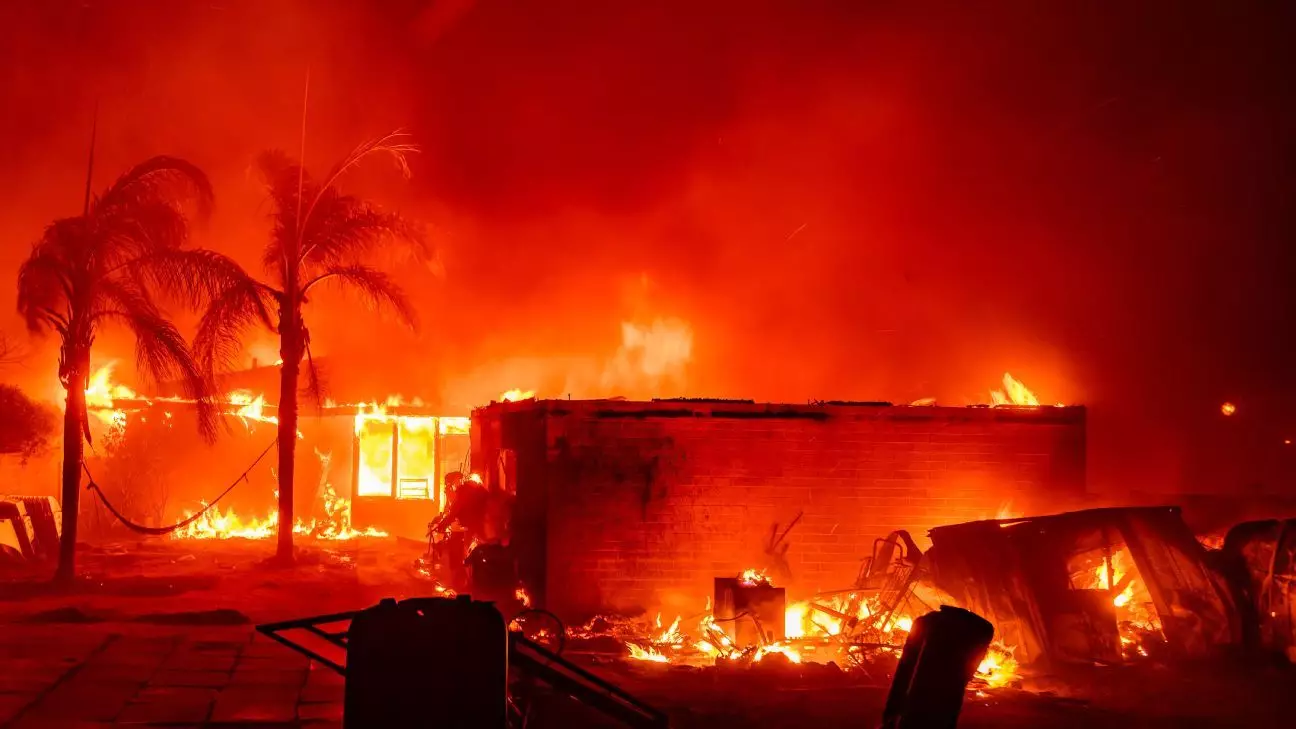As wildfires sweep across Los Angeles, the destructive force of nature is forcing residents to evacuate their homes, significantly affecting air quality and disrupting daily life. The wildfires pose a potential threat not only to the local population but also to the upcoming NFL playoff game featuring the Minnesota Vikings and the Los Angeles Rams at SoFi Stadium. The league is closely monitoring the situation and has developed contingency plans to ensure the safety and continuity of the game, indicating a serious commitment to both public safety and sports entertainment.
The NFL’s proactive approach in addressing the wildfires illustrates the league’s urgent interest in safeguarding everyone involved in the game. Despite intentions to proceed with the game at SoFi Stadium in Los Angeles, the NFL has a backup plan to relocate the event to State Farm Stadium in Glendale, Arizona, should conditions worsen. This precaution harkens back to 2003 when the league moved a regular-season match due to similar fire threats. Such measures underline the unpredictability of natural disasters and their potential impact on scheduled events, rendering the NFL’s forward-thinking strategy instrumental in managing unforeseen circumstances.
The league’s statement importantly highlights that the safety of players, staff, and fans is paramount. Moving a game is a complex process that requires coordination across multiple facets, including logistics and communication with local authorities. By ensuring that these plans are in place, the NFL demonstrates a sophisticated understanding of the potential risks and chaos that wildfires can bring.
Both Los Angeles-based teams, the Rams and Chargers, are acutely aware of the situation unfolding in their city. While the Rams remain focused on their training schedule without any immediate disruptions reported among players or staff, they still extend their support for those affected by the fires. Star receiver Cooper Kupp’s heartfelt message emphasizes the need for community in times of crisis, acknowledging first responders and firefighters who put their lives on the line.
For the Chargers, practice adaptations are necessary. To protect players from the unhealthy air quality, which often teeters between “very unhealthy” and hazardous levels, the team’s practice regimen has been tweaked to minimize outdoor exposure. Coaches are prioritizing players’ safety and implementing robust protocols to maintain health while preparing for the upcoming playoff game. This dual focus on health and preparation reflects an understanding that physical readiness is crucial, but the well-being of the team takes precedence.
Air quality has undeniably suffered during these wildfires, raising urgent concerns about health risks for everyone in the area. Reports indicate that the air quality index in specific regions has surged throughout the scale, with readings surpassing levels that are considered acceptable. Teams like the Chargers are rightly concerned not just about their players but also about the broader impacts on the community, as smoke and ash envelop neighborhoods. With statistics indicating that certain areas are reaching air quality levels close to 300, there could be profound implications for public health, particularly for those with pre-existing health conditions.
Furthermore, the Chargers have pledged substantial financial support to various organizations helping to combat the crisis. This commitment highlights the team’s awareness of its role in the community, extending beyond the football field. Their decision to allocate funds for disaster response efforts and animal rescue organizations illustrates a philanthropic approach, underscoring the importance of community support in the face of disasters.
California’s wildfire seasons are growing longer and more intense due to climate change, resulting in more frequent occurrences even during traditionally less active months, such as January. The fires experienced this year alone highlight an alarming trend, with fire seasons extending into periods previously considered safe. This situation poses a challenge not only for local residents but also for cities, sports leagues, and agencies required to respond to emergencies more frequently.
The unique combination of an unpredictable climate and deteriorating environmental factors calls for improved strategies for disaster preparedness and community resilience. It is vital for local governments, organizations, and communities alike to step up preventative measures, ensuring that they can mitigate the risks associated with wildfires in the future.
As wildfires continue to wreak havoc across Los Angeles, the NFL’s contingency planning and team adaptations reflect ongoing efforts to navigate these crises. However, the longer-term implications of climate change highlight an urgent need for sustainable practices and community-wide strategies aimed at preventing disasters and supporting those in need. The interplay between sports, community resilience, and environmental challenges encapsulates a broader narrative deserving of attention and action in our increasingly unpredictable world.


Leave a Reply